General
NCHE Commends Mak’s Readiness to Implement Emergency ODeL
Published
5 years agoon
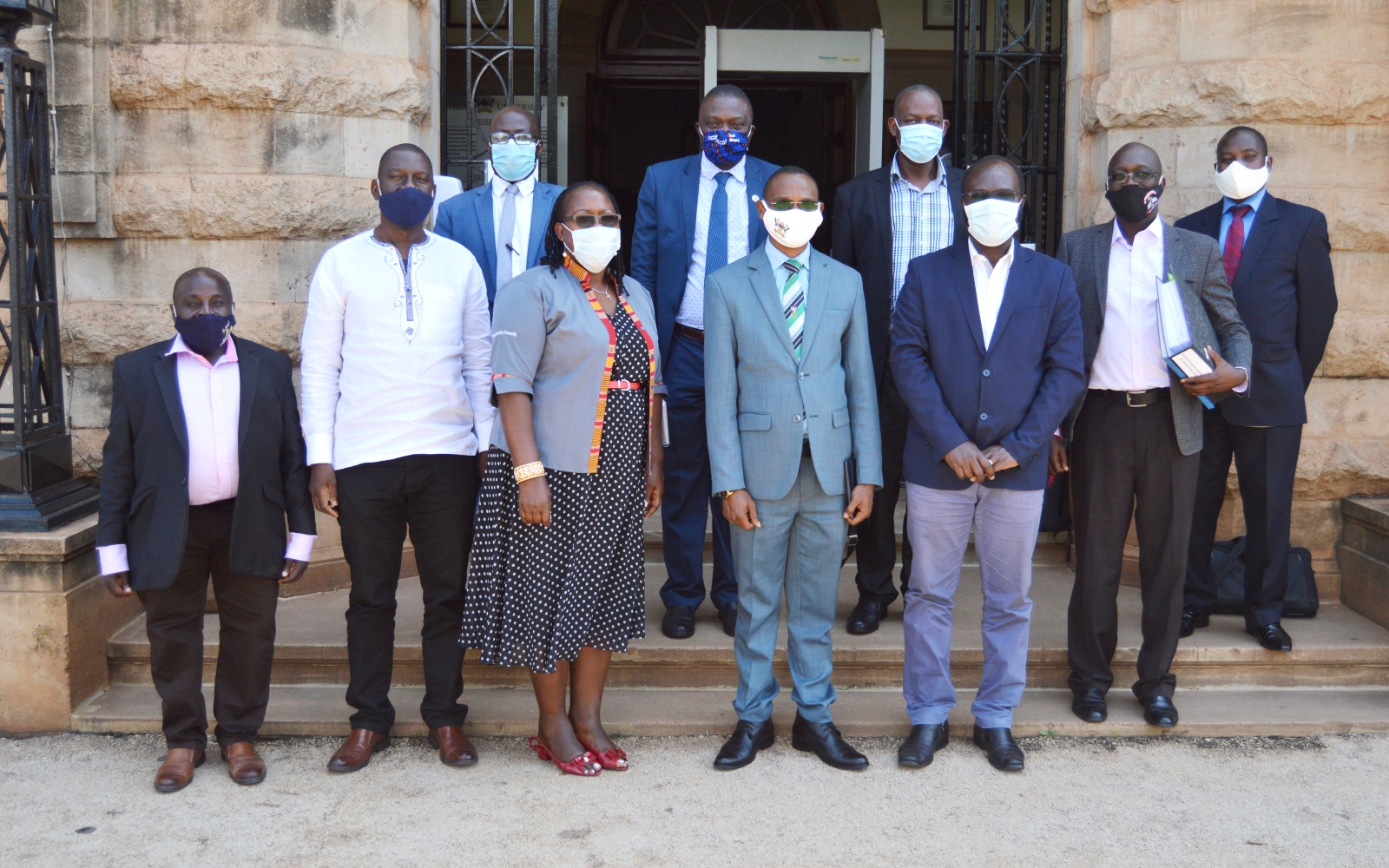
A team from the National Council for Higher Education (NCHE) on Wednesday 2nd September 2020 visited Makerere University to ascertain the institution’s readiness to undertake emergency Open, Distance and e-Learning (ODeL). The inspection followed guidelines for adoption of emergency ODeL during the COVID-19 lockdown issued by NCHE to Higher Education Institutions (HEI) on 3rd July 2020.
Makerere in response appointed an E-Learning Fast Tracking Taskforce led by Assoc. Prof. Paul Birevu Muyinda, which prepared and submitted a proposal to NCHE on 25th August 2020. Other members of the taskforce are; Prof. Jessica Aguti-Director Institute of Open, Distance and e-Learning (IODeL), Prof. Fred Masagazi Masaazi-Principal College of Education and External Studies (CEES), Assoc. Prof. Gilbert Maiga, Assoc. Prof. Engineer Bainomugisha and Dr. Evelyn Kahiigi from the College of Computing and Information Sciences (CoCIS), Mr. Samuel Mugabi-Director Directorate for ICT Support (DICTS) as well as Mr. Richard Kajumbula and Mr. Godfrey Mayende from IODeL.
The NCHE Team led by Dr. Andogah Geoffrey, Dean Faculty of Technoscience Muni University also had Dr. Robert Ayine, NCHE’s Senior Higher Education Officer Quality Assurance as the other member.
Welcoming the inspection team, Members of Management, staff in the Main Hall as well as participants on ZOOM, the Vice Chancellor Prof. Barnabas Nawangwe expressed Makerere University’s eagerness to implement emergency ODeL, given its over 20-year experience with Distance Learning. The first phase of the African Virtual University (AVU) was launched at Makerere University in 1997. AVU was a distance education project funded by the World Bank to deliver university education in the sub-Saharan Africa countries of Ethiopia, Ghana, Kenya, Namibia, Tanzania, Uganda, and Zimbabwe.
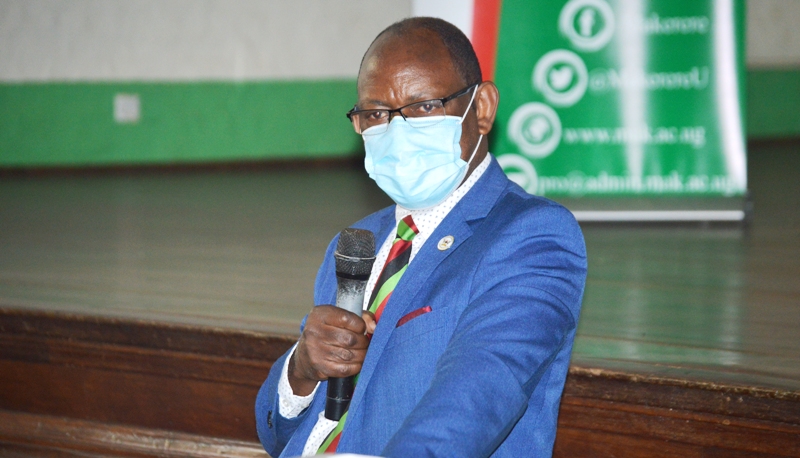
“Our strategic plan 2020-2030 puts emphasis on ODeL because we know that for one, there is going to be an increased demand for higher education in the region which cannot be met by the conventional teaching methods and secondly it prioritises learner-centred pedagogy where the student takes lead and the instructor simply facilitates the learning process” remarked the Vice Chancellor.
Prof. Nawangwe shared with the inspection team that Makerere University has the best ICT infrastructure outside South Africa. This was reiterated in the Director DICTS’ presentation wherein he showed that; Makerere has 32km of fibre optic cable network linking every building to the Network Operations Centre (NOC), 2,200Mbps of bandwidth at a subsidized cost from the Research and Education Network for Uganda (RENU), an Incident Response System where the student and staff community can log tickets for ICT-related issues among other amenities.
With reference to Library resources available to support ODeL, the Vice Chancellor said “With approximately 12million electronic journal titles available to our users, we have the largest consumption in Africa.” This was expounded upon by the University Librarian, Assoc. Prof. Helen Byamugisha and her team’s presentation to NCHE when the inspectors made a brief stopover at the Main Library.
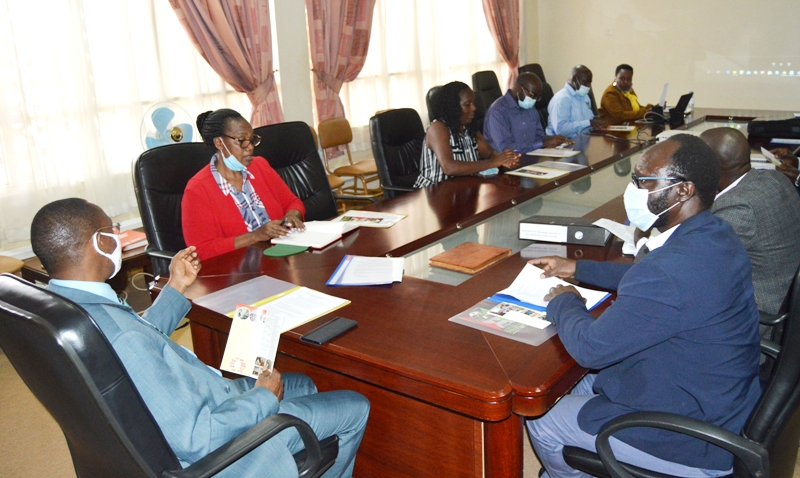
The team consisting of Deputy University Librarian-Assoc. Prof. Ruth Nalumaga, E-Resources National Coordinator-Ms. Caroline Kobusingye and Systems Administrator-Mr. Timothy Sentamu shared that the Library has; 49 subject/discipline-specific databases, over 240,000 e-Book titles and 7,792 digitized materials accessible. Furthermore, that the Library’s Online Public Catalogue print collection has; 258,900 books, 16,402 archives, 11,698 serials and 4,980 e-Books available to users. The Library relies on EzProxy; a remote access tool, to enable off-campus users access electronic resources, especially during the COVID-19 lockdown. These resources and more are accessible to staff, students and members of the public provided that they are registered with the University Library.
To further emphasize Mak’s readiness, Prof. Nawangwe shared that the University is a leading partner of international ODeL consortia such as EPICA. “Most recently, we partnered with UNESCO-ICHEI to inaugurate the International Institute of Online Education so as to train our staff in e-Learning technologies and I am happy to report that several members of staff have benefited.
Additionally, Prof. Jessica Aguti, our Director Institute of Open, Distance and e-Learning spent three years (April 2014 to April 2017) as an Education Specialist at the Commonwealth of Learning in Vancouver, Canada and brings vast experience to our efforts to continue implementing ODeL at Makerere.”
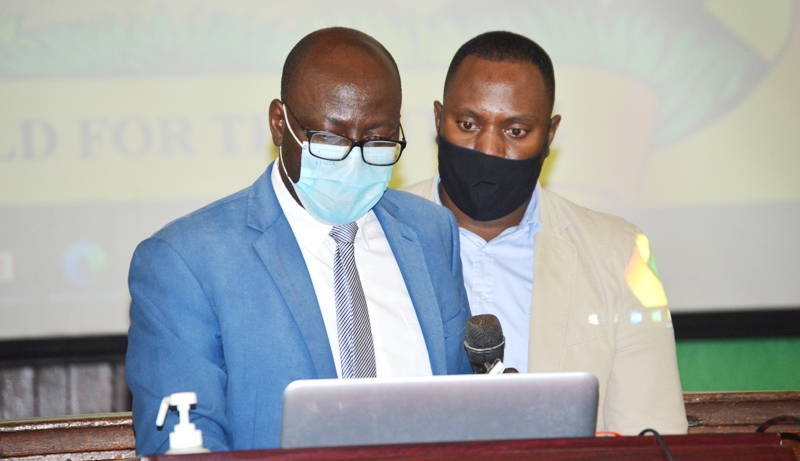
The Vice Chancellor concluded his remarks by reassuring NCHE that the institution has put in place several measures to ensure that no student is left behind in the implementation of emergency ODeL. He reported that Makerere University had during the lockdown managed to secure zero-rate access to its e-Learning and other platforms from Africell, Airtel and MTN and would continue to negotiate for similar enablers of ODeL from the telecommunication companies.
In his presentation of Mak’s Readiness for the ODeL System, the Deputy Vice Chancellor in charge of Academic Affairs (DVCAA), Assoc. Prof. Umar Kakumba guaranteed the inspectors that the university would in addition to existing resources on MUELE utilize tools such as social media and facilities such as the upcountry learning centres to ensure that the emergency ODeL roll-out is comprehensive. In terms of staff readiness, he shared that over 500 staff had been trained by IODeL in developing and setting up course material on the Makerere University E-Learning Environment (MUELE).
The staff training also covered maximizing the benefits of working with ZOOM to conduct synchronous/live classes. As part of the presentations, the inspectors in a live demonstration joined an ongoing IODeL training session for teams at the College of Business and Management Sciences (CoBAMS). Trainees were then asked to take part in an exercise that gauges active participation and understanding of the concepts being taught. The inspectors and audience in the Main Hall were then able to watch in real-time using another tool called MENTEE as feedback from the class came forth and formed a word cloud with the most frequent responses dominating in size. This feedback, said the IODeL team, can then be used by the instructor to analyse the level of participation by learners and gauge which concepts need further explanation.
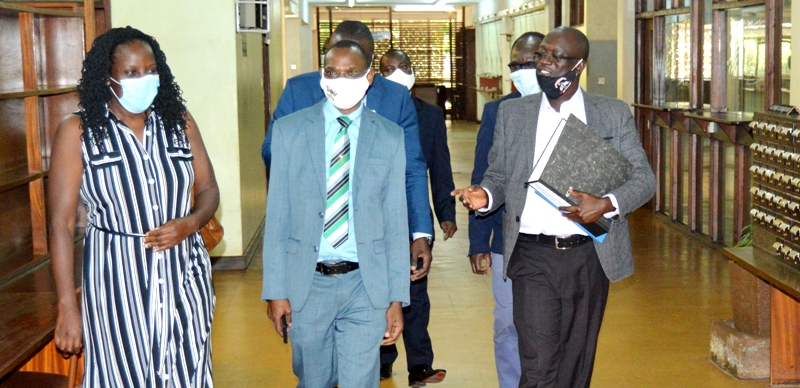
The DVCAA in his presentation equally noted that whereas learning materials and facilities required to implement emergency ODeL were in place, work still needs to be done to improve the attitude and motivation of students to access existing electronic resources. One of the July 2020 NCHE guidelines required Mak to undertake a survey to determine students’ willingness to participate in emergency ODeL. Presenting results from that survey, the Director Quality Assurance-Dr. Vincent Ssembatya demonstrated that the majority (64.11%) of the students who took part in the survey were willing to continue under emergency ODeL.
“What surprised us about these results was that at 71.84%, the first year students demonstrated the highest willingness to continue studying under emergency ODeL, compared to their colleagues in final year” remarked Dr. Ssembatya.
An analysis of the reasons for students’ unwillingness to continue under emergency ODeL revealed mobile data as the most dominant. Further investigation of the mobile data reason using NVivo – a qualitative data analysis tool –revealed expensive data bundles as the foremost challenge. Other reasons cited by students for their unwillingness included the practical nature of particular courses and the short period left to the conclusion of their academic programmes.
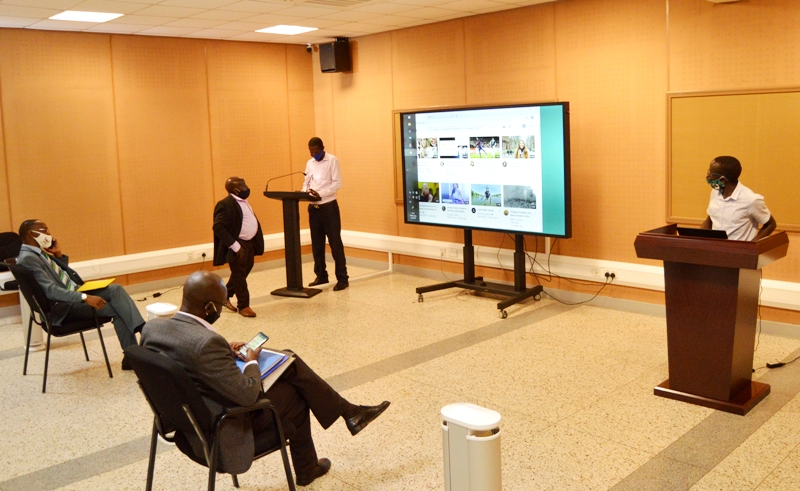
Outlining the six-week roadmap for completion of the academic year in the event of re-opening under emergency ODeL, the DVCAA said “the immediate strategy is to complete the theoretical part of the syllabus and for the practical sessions, units will group students into cohorts of 15-20 per session so as to fit within the COVID-19 Standard Operating Procedures (SOPs) for social distancing. Exams will then be conducted in the last two or three weeks of the period.”
In addition to the Main Library, the inspection team was taken on a tour of the new multimedia studio on Level 4 of the Central Teaching Facility 1 (CTF1) where instructors can record teaching material using state-of-the-art aids in a soundproof environment. They thereafter visited CoCIS where the Principal, Prof. Tonny Oyana took them on a guided tour of the e-Learning Centre as well as the Smart Classroom – the first installation in Uganda. Upon completion, the 50-seater Smart Classroom will make use of a combination of Artificial Intelligence (AI) and Natural Language Processing (NLP) in particular to analyse students’ learning patterns and abilities and come up with new models of instruction unique to each learner.
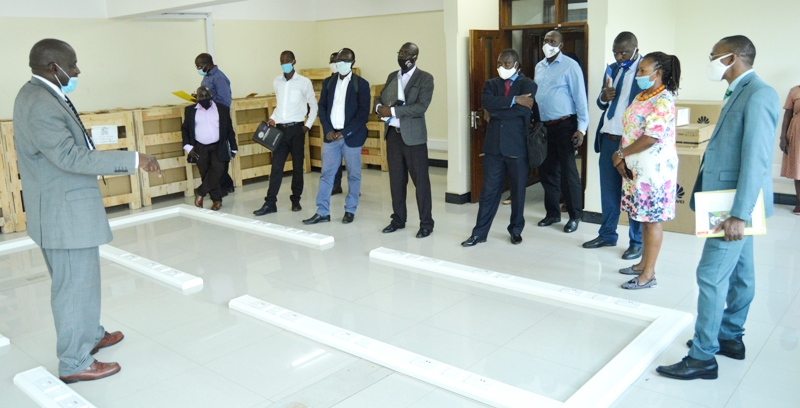
The team concluded its inspection of facilities with a visit to the DICTS NOC for a guided tour of the core ICT infrastructure that hosts the e-Learning as well as other university services. A debrief session was held at the Guest House, where inspectors expressed satisfaction with Makerere University’s demonstration of readiness to resume teaching and learning under emergency ODeL.
“I thank Makerere University for taking leadership in this exciting new phase of implementing emergency ODeL. You have demonstrated your readiness and I think all other Higher Education Institutions will emulate you” remarked Dr. Andogah the inspection Team Leader.
He added that it was the simple but equally impressive installations like the Touchless Handwashing Kit (TW-20) at the entrance to the Main Building that demonstrated Makerere University’s ability to innovate and cater to the wellbeing of members of its community.
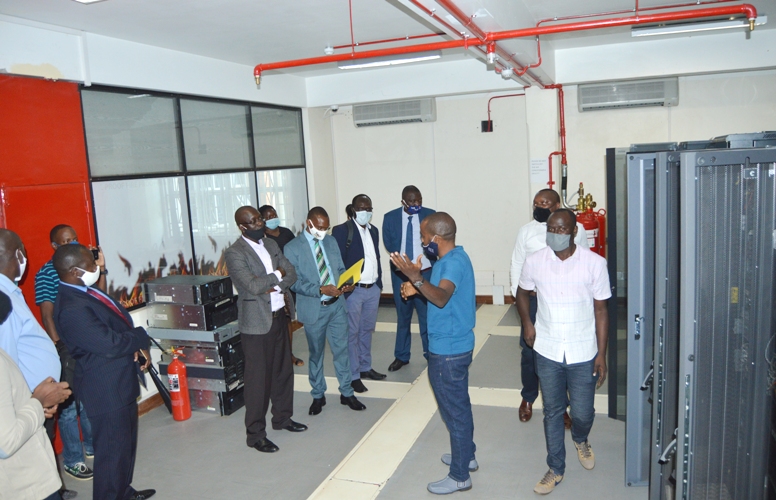
Dr. Ayine on his part applauded Makerere University as the leading institution for taking the initiative to promote Distance Education and ODeL even before the advent of COVID-19. He shared that the average national tertiary gross enrolment stands at less than 10% and one of the roles of Makerere University is to increase access to higher education.
He concluded by asking the leadership to ensure that in addition to maintaining infrastructure, instructors and facilitators are supported to monitor the participation and progression of learners on MUELE. To help achieve this, IODeL has developed a training schedule for systems administrators and ICT staff at college level to ensure that they will be able to support the different user needs.
Please see the links below for the day’s presentations
Article by Public Relations Office
You may like
-
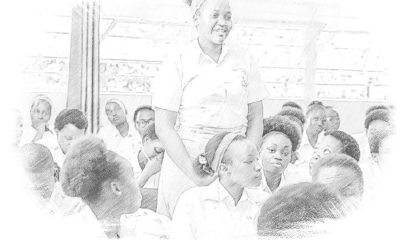

Ugandan Study Flags Girls and Senior Students as a Mental Health High-Risk Group
-
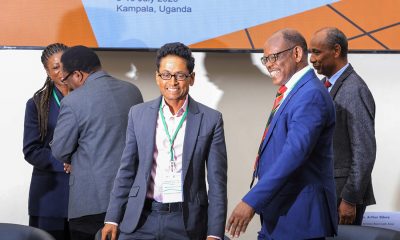

Makerere Hailed for Its Leadership in Health Policy and Knowledge Systems
-
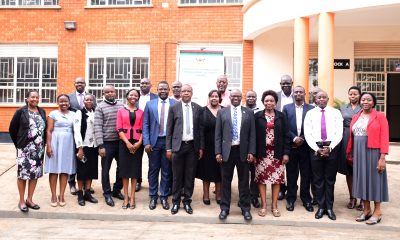

School of Business Conducts Strategic Leadership Training for Makerere University Managers
-
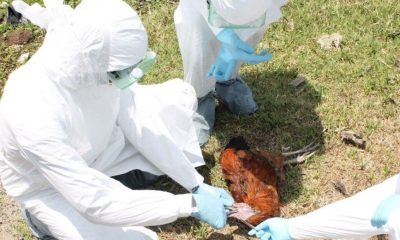

Advancing Regional Health Priorities Through the CARTA Research Hubs
-


Freshers’ Joining Instructions 2025/2026
-


UVCF Makes Case for HEAC Programme
General
Simplicity, Service & Scholarship: Hallmarks of Professor Livingstone Luboobi’s Legacy
Published
9 hours agoon
July 18, 2025By
Eve Nakyanzi
On Wednesday 16th July 2025, Makerere University lost one of its most cherished sons, Professor Livingstone Sserwadda Luboobi. Described as a mathematician, academic leader, and humble servant, Professor Luboobi devoted more than five decades to the university, rising through the ranks to become Vice Chancellor, and leaving a legacy defined by simplicity, service, and scholarship.
Born to Lameka Serwadda and Sanyu Serwadda on 25th December 1944 in Mitondo, Kalisizo, Kyotera District, Professor Luboobi’s academic career begun as a third-year student at Makerere and continued with unwavering loyalty until his passing. His life’s work reflected not only a commitment to mathematics but also nurturing generations of scholars and leaders across Uganda and beyond.
A funeral service was held in his honour at St. Francis Chapel, Makerere University on 18th July 2025. It was a moment of solemn remembrance and heartfelt tribute. Rev. Canon Dr. John Senyonyi delivered the sermon titled “Only God Knows,” reminding mourners of the mystery and grace of life’s journey. Rev. Canon Geoffrey Byarugaba represented the Kampala Diocese at the service, while former St. Francis Chaplain, Rev. Dr. Canon Johnson Ebong thanked Professor Luboobi for spearheading the Chapel’s expansion. Friends, colleagues, and family members filled the chapel, joined in mourning but also in gratitude for a life that had deeply touched theirs.

Mrs. Lorna Magara, Chairperson of the University Council, spoke movingly about Professor Luboobi’s faithfulness, likening his life to the biblical call in Mark 10:43, “Whoever wants to become great among you must be your servant.”
In his condolence message, the Vice Chancellor, Professor Barnabas Nawangwe, hailed Professor Luboobi as a visionary leader whose legacy is deeply woven into Makerere’s identity as a research-led institution. He credited Professor Luboobi with laying the groundwork for a culture of inquiry—championing graduate programmes, encouraging doctoral training, and fostering international collaborations that strengthened the university’s research profile. “He believed in building systems, not just structures,” noting that many of Makerere’s current research policies stem from his leadership. Even in retirement, Professor Luboobi remained a source of wisdom and guidance, quietly shaping the future of the university he so deeply loved.
Speaker after speaker painted a portrait of a man who led not by pomp, but by quiet strength and deep conviction. The Principal, Professor Winston Tumps Ireeta, speaking on behalf of the College of Natural Sciences (CoNAS), described Professor Luboobi as a foundational figure whose influence is deeply etched in the structures and spirit of the college. He spoke with emotion about Luboobi’s unwavering commitment to academic integrity and his belief in the power of mentorship.

“He was not just a mathematician,” Professor Ireeta said, “he was a visionary who understood the soul of the university. Even in retirement, he remained an advisor, a guide, and a quiet force of wisdom.” He concluded by saying that the college would continue to draw from his example as it navigates the future of science and innovation in Uganda.
Professor Luboobi’s illustrious career at Makerere University included serving as Head, Department of Mathematics from 1990 to 1991. The current Head of Department, Dr. Ismail Mirumbe remembered him as a pillar in the teaching and development of mathematics in Uganda
Professor John Mango, who served as Head, Department of Mathematics during Professor Luboobi’s term as Vice Chancellor from 2004 to 2009 described him as a towering figure of integrity and principle, someone who not only upheld the highest standards of academic conduct but insisted that others around him do the same. “He was a pillar in the department,” Prof. Mango remarked, “and his moral compass was unwavering.”

He recalled instances where Professor Luboobi made firm decisions, including terminating contracts when integrity was compromised, setting a tone that shaped the department’s reputation for honesty and excellence. Even as Vice Chancellor, he remained deeply involved in the department’s affairs, teaching, supervising students, all the while handling top administrative duties punctually. Prof. Mango spoke with great admiration of a man who led by example, mentored many, and whose contributions to mathematics education, research, and policy-making continue to shape the future of the discipline in Uganda and beyond.
According to an article from 1990 written by Dr. Vincent Ssembatya and Andrew Vince at the University of Florida, the Uganda Mathematical Society (UMS), which was formally established on 25th November, 1972 has since inception enjoyed major support from Makerere University and Kyambogo University in terms of infrastructure and leadership. Professor Paul Mugambi, who was also present at Professor Luboobi’s funeral service was elected first president of the UMS. Dr. Saul Nsubuga from the Department of Mathematics represented UMS at the service, honouring Professor Luboobi’s pioneering role in the discipline.
The service also featured tributes from close friends and family. Loved ones shared stories of a man who remained grounded no matter how high he rose, a man who valued relationships and walked closely with his faith. His children and grandchildren remembered him as a father who was ever-present, a listener, and a source of steady guidance.

Professor Daniel Kibuule, son of the late Professor Luboobi and Dean, Faculty of Health Sciences at Busitema University, delivered a deeply personal tribute that painted a full portrait of his father’s life, values, and final days. He expressed gratitude to the University leadership, family, friends, and medical professionals who stood with them during a challenging period. He particularly thanked his siblings, Dr. David Kimera and Dr. Irene Nakiyimba for their unwavering role in caring for Professor Luboobi through illness.
He spoke of a man who, despite great academic accolades, remained deeply humble and committed to discipline, simplicity, and faith. From instilling punctuality and responsibility to ensuring his children charted their own paths, none bearing his surname “Luboobi”, Prof. Luboobi was intentional in every lesson he passed on. Kibuule recalled his father’s insistence on being at home even in his final moments, his strong connection to Christ, and his quiet strength despite his failing health.
Former students and mentees echoed the same sentiments, of a teacher who was generous with his time and invested deeply in others’ growth. The community that gathered was not only there to grieve but to celebrate the quiet legacy of a man whose example continues to live on.
Among the mourners were public figures and leaders, including Hon. Abed Bwanika, Member of Parliament for Kimanya-Kabonera, Hon. Nyombi Thembo, the Executive Director Uganda Communications Commission, and Hon. Dr. Ham-Mukasa Mulira, former Minister of ICT, among others.
In his passing, Makerere University has lost a pillar, but his life reminds us that greatness lies in consistency, in humility, and in service to others. Professor Luboobi’s memory will continue to live on in the minds he shaped, the systems he built, and the values he embodied. He ran his race with grace.
The Writer is a Volunteer in the Public Relations Office, Makerere University
Please click the embedded video below to view the service livestream
General
Public University Legal and Accounting Officers Trained on Governance and Compliance
Published
2 days agoon
July 17, 2025By
Eve Nakyanzi
Legal and accounting officers from public universities across Uganda have convened, for a high-level training workshop organized by Makerere University. The three-day training, taking place from July 16th to 18th, 2025, is aimed at strengthening legal frameworks, improving institutional governance, and ensuring compliance with public finance and procurement laws within higher education institutions.
Ms. Lorna Magara, Chairperson of the Makerere University Council and Guest of Honour at the opening session, commended the initiative as timely and necessary. She addressed the growing backlog of court cases affecting Makerere and other public universities and outlined measures already taken to mitigate legal risks. These include the establishment of a Legal Rules and Privileges Committee and the Directorate of Legal Affairs, part of a broader strategy to improve legal compliance and foster good governance.
Representing the Vice Chancellor, Prof. Winston Tumps – Ag. Deputy Vice Chancellor (Finance and Administration), described the training as both strategic and practical. “It is imperative that we learn from each other, especially in how we handle employee litigation and institutional legal risks,” he remarked. He added that the program is designed to promote experience-sharing across universities and enhance collective institutional growth.

In his address, Mr. Yusuf Kiranda, University Secretary at Makerere University, emphasized the urgent need for robust legal oversight and more effective case management mechanisms within public universities.
The training featured a keynote address by the Attorney General of Uganda, Hon. Kiryowa Kiwanuka, who provided critical insights into legal expectations for public institutions. He warned that failure to heed legal advice could result in personal liability for accounting officers, citing a precedent involving the Uganda Cancer Institute. “Universities must consult the Attorney General’s chambers before entering into major contractual obligations,” he advised, urging legal officers to document decisions meticulously as proper record-keeping forms the first line of defense in legal disputes.

Hon. Kiwanuka further discussed the government’s ongoing efforts to recentralize legal services to ensure alignment with the Attorney General’s office. He cautioned in-house counsel against becoming overly entangled in decision-making processes, stressing the need for objectivity. Other key issues he addressed included contract approvals, misuse of Memoranda of Understanding (MoUs), and lapses in procurement processes, particularly at the close of financial years.
Participants also benefited from insights by Hon. Justice Musa Ssekaana of the Court of Appeal, who offered an in-depth analysis of judicial review and its significance in promoting lawful, transparent university governance. He called on university legal officers to act with clarity, timeliness, and accountability.
Lady Justice Joyce Kavuma, Judge of the High Court, delivered a comprehensive presentation on dispute and claim management involving public universities. She addressed emerging trends in civil litigation, emphasizing the importance of due process, transparency, and clear communication in resolving employment, student, and contractual disputes. Drawing on real case examples, she urged institutions to strengthen internal systems, embrace participatory governance, and adopt regional best practices to minimize litigation and protect institutional reputation.

The training reflects a shared commitment among public universities to build a more accountable, legally sound, and strategically aligned higher education system in Uganda. Through peer learning and collaboration, participating institutions aim to reduce litigation, enhance institutional autonomy, and uphold the rule of law.
Participating universities include Makerere University, Kyambogo University, Mbarara University of Science and Technology, Busitema University, Mountains of the Moon University, and Lira University.
The training concludes on July 18th 2025, with sessions focusing on employment dispute management in public universities and the implications of recent PPDA Appeals Tribunal decisions on procurement and disposal practices within public entities.
General
Celebrating the Life of Prof. Livingstone Sserwadda Luboobi
Published
2 days agoon
July 17, 2025By
Mak Editor
A Visionary Leader, Seasoned Mathematician, & Humble Academician
It is with profound love and respect that we celebrate the life of Prof. Livingstone Sserwadda Luboobi, a distinguished scholar, transformative leader, and beloved Vice Chancellor Emeritus of Makerere University. His legacy is woven in the fabric of African higher education, marked by intellectual brilliance, unwavering commitment to academic excellence, and a life of selfless service.
A Life of Purpose and Vision
Prof. Luboobi was more than a mathematician. He was a visionary, whose work transcended equations and research papers. Serving as Vice Chancellor from 2004 to 2009, he led Makerere University through a critical period of growth and transformation. Under his guidance, the university expanded its reach, strengthened its academic rigor, and embraced innovation and reform. His calm demeanour and principled decision-making earned the admiration of students, faculty, and peers alike.
Prof. Luboobi was deeply committed to nurturing talent and fostering intellectual curiosity, leaving an indelible mark on the institution’s culture and future direction.
Beyond Uganda, Prof. Luboobi’s influence resonated across the global academic community. He was a passionate advocate for the transformative power of science and education, often speaking at international forums and collaborating on research that bridged continents and disciplines. His work helped elevate the profile of African scholarship on the world stage.
His legacy endures not only in the impressive body of work he left behind but also in the countless lives he touched – students, educators, and leaders who continue to draw inspiration from him.
Academic and Leadership Journey at Makerere University
An illustrious alumnus of Makerere University, Prof. Luboobi graduated with First Class Honours in Mathematics, laying the foundation for an extraordinary academic journey. He pursued further studies at the University of Toronto (MSc in Operations Research, 1971-72) and the University of Adelaide (PhD in Biomathematics, 1978–80). His scholarly journey spanned prestigious institutions worldwide, including UCLA, the University of Bergen, and the University of Dar es Salaam, establishing him as a scholar of global repute and a proud ambassador of African intellectualism.
Prof. Luboobi’s service to Makerere begun in 1970 as a Special Assistant-remarkably, while still an undergraduate, rising through the ranks to full Professor in 1997. He served as Head of Department, Dean of the Faculty of Science (1994–2001), and later became the university’s first elected Vice Chancellor. His tenure brought new energy to institutional leadership, characterized by transparency, inclusivity, strategic direction and accountability.
Strategic Reforms and Institutional Impact
A true architect of transformation, Prof. Luboobi chaired the development of Makerere’s first locally-conceived Strategic Plan (1990–91). He was instrumental in securing a UGX30 billion grant from NORAD in 1999, which revitalized key academic areas such as computing, gender studies, and food science. He co-founded the Makerere University Private Sector Forum, bridging the gap between academia and industry, and strengthening alumni engagement and resource mobilization.
Pioneering Biomathematics and Mentorship
As one of Africa’s pioneering biomathematicians, Prof. Luboobi introduced mathematical modeling to tackle real-world problems in epidemiology, ecology, and operations research. His scholarly contributions – over 150 publications – reflect the depth and breadth of his research. Yet, perhaps his most lasting impact lies in mentorship: he supervised more than 35 PhD and over 50 MSc students, including Makerere’s first female PhD graduate in Mathematics, nurturing a generation of scholars and leaders.
Prof. Luboobi’s Contribution to the Internationalization of Makerere University
Prof. Luboobi played a pivotal role in advancing the international profile of Makerere University. Demonstrating remarkable personal commitment, he utilized his own resources to support the establishment of the University’s International Office. This strategic initiative laid the foundation for a more structured and effective engagement with global academic institutions, development partners, and international students. As a result, Makerere University significantly enhanced its global footprint, forming numerous international collaborations and attracting increased academic and research opportunities from abroad.
In addition to his contributions to internationalization, Prof. Luboobi was also instrumental in revitalizing the University’s Public Relations Unit. Under his guidance, the unit adopted more proactive and professional communication strategies, which greatly improved the institution’s public image. This, in turn, fostered greater public trust and strengthened the university’s reputation both locally and internationally. His visionary leadership in these areas has had a lasting impact, positioning Makerere University as a leading institution in East Africa and beyond.
Global Recognition and Enduring Legacy
Prof. Luboobi’s contributions earned him widespread recognition. In 2008, the University of Bergen awarded him an Honorary Doctorate for his role in internationalizing academia. Makerere University honoured him with a Lifetime Achievement Award in 2013, and the Government of Uganda conferred upon him a National Gold Medal for his unwavering service to education and national development.
Even after retirement, Prof. Luboobi remained an active contributor to academic life-lecturing, supervising, and advising the university.
A Lasting Light in African Academia
Prof. Livingstone Sserwadda Luboobi’s life was a model of scholarship anchored in service, leadership tempered with humility, and an unshakable belief in the power of education. He leaves behind a vibrant academic legacy and a trail of inspired minds. His contributions will continue to shape Makerere University, Uganda, and the global academic community for generations to come.
We extend our heartfelt condolences to his family, colleagues, and the entire Makerere University community during this difficult time.
May his soul rest in eternal peace.
Trending
-

 General2 weeks ago
General2 weeks agoRe-advert: Admission to Undergraduate Programmes 2025/2026
-

 General1 week ago
General1 week agoRe-Advert for Applications for Diploma and Certificate Training
-

 General5 days ago
General5 days agoMakerere University Fees Waiver for 40 First Year Female Students 2025/2026
-

 General2 weeks ago
General2 weeks agoPress Statement on Ranking
-

 Health1 week ago
Health1 week agoCall for Applications: Responsible Conduct of Research (RCR) Training Course
